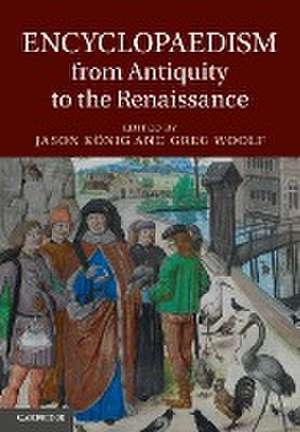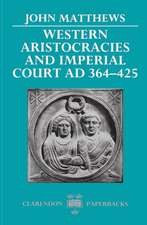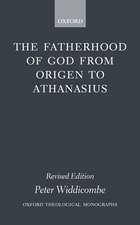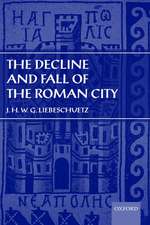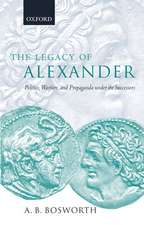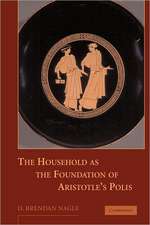Encyclopaedism from Antiquity to the Renaissance
Editat de Jason König, Greg Woolfen Limba Engleză Paperback – 8 feb 2024
| Toate formatele și edițiile | Preț | Express |
|---|---|---|
| Paperback (1) | 393.09 lei 6-8 săpt. | |
| Cambridge University Press – 8 feb 2024 | 393.09 lei 6-8 săpt. | |
| Hardback (1) | 916.37 lei 6-8 săpt. | |
| Cambridge University Press – 16 oct 2013 | 916.37 lei 6-8 săpt. |
Preț: 393.09 lei
Nou
Puncte Express: 590
Preț estimativ în valută:
75.24€ • 81.76$ • 63.24£
75.24€ • 81.76$ • 63.24£
Carte tipărită la comandă
Livrare economică 21 aprilie-05 mai
Preluare comenzi: 021 569.72.76
Specificații
ISBN-13: 9781009490757
ISBN-10: 1009490753
Pagini: 618
Ilustrații: Worked examples or Exercises; 1 Tables, black and white; 3 Halftones, unspecified; 3 Halftones, black and white
Dimensiuni: 170 x 244 x 33 mm
Greutate: 1.05 kg
Editura: Cambridge University Press
ISBN-10: 1009490753
Pagini: 618
Ilustrații: Worked examples or Exercises; 1 Tables, black and white; 3 Halftones, unspecified; 3 Halftones, black and white
Dimensiuni: 170 x 244 x 33 mm
Greutate: 1.05 kg
Editura: Cambridge University Press
Cuprins
1. Introduction: Jason König and Greg Woolf; Part I. Classical Encyclopaedism: 2. Encyclopaedism in the Roman Empire Jason König and Greg Woolf; 3. Encyclopaedism in the Alexandrian Library Myrto Hatzimichali; 4. Labores pro bono publico: the burdensome mission of Pliny's Natural History Mary Beagon; 5. Encyclopaedias of virtue? Collections of sayings and stories about wise men in Greek Teresa Morgan; 6. Plutarch's corpus of Quaestiones in the tradition of imperial Greek encyclopaedism Katerina Oikonomopoulou; 7. Artemidorus' Oneirocritica as fragmentary encyclopaedia Daniel Harris-McCoy; 8. Encyclopaedias and autocracy: Justinian's Encyclopaedia of Roman law Jill Harries; 9. Late Latin encyclopaedism: towards a new paradigm of practical knowledge Marco Formisano; Part II. Medieval Encyclopaedism: 10. Byzantine encyclopaedism of the ninth and tenth centuries Paul Magdalino; 11. The imperial systematisation of the past in Constantinople: Constantine VII and his Historical Excerpts András Németh; 12. Ad maiorem Dei gloriam: Joseph Rhakendytès' synopsis of Byzantine learning Erika Gielen; 13. Shifting horizons: the medieval compilation of knowledge as mirror of a changing world Elizabeth Keen; 14. Isidore's Etymologies: on words and things Andrew Merrills; 15. Loose Giblets: encyclopaedic sensibilities of ordinatio and compilatio in later medieval English literary culture and the sad case of Reginald Pecock Ian Johnson; 16. Why was the fourteenth century a century of Arabic encyclopaedism? Elias Muhanna; 17. Opening up a world of knowledge: Mamluk encyclopaedias and their readers Maaike van Berkel; Part III. Renaissance Encyclopaedism: 18. Revisiting Renaissance encyclopaedism Ann Blair; 19. Philosophy and the Renaissance encyclopaedia: some observations D. C. Andersson; 20. Reading 'Pliny's Ape' in the Renaissance: the Polyhistor of Caius Julius Solinus in the first century of print Paul Dover; 21. Shakespeare's encyclopaedias Neil Rhodes; 22. Big Dig: Dugdale's drainage and the dregs of England History of Embanking and Drayning Claire Preston; 23. Irony and encyclopedic writing before (and after) the Enlightenment William West; Part IV. Chinese Encyclopaedism: A Postscript: 24. The passion to collect, select, and protect: fifteen hundred years of the Chinese encyclopaedia Harriet Zurndorfer.
Recenzii
'… this volume can be used in two different ways: each article can be read separately (I think it will be its main use), but the whole reading is stimulating. The interest of this book is to remind us that the theme of encyclopaedism, apparently limited to a technical genre, is not of small importance: it enables us to think about intertextuality, visions of the world or relations between power and knowledge.' Jacques Elfassi, Bryn Mawr Classical Review
